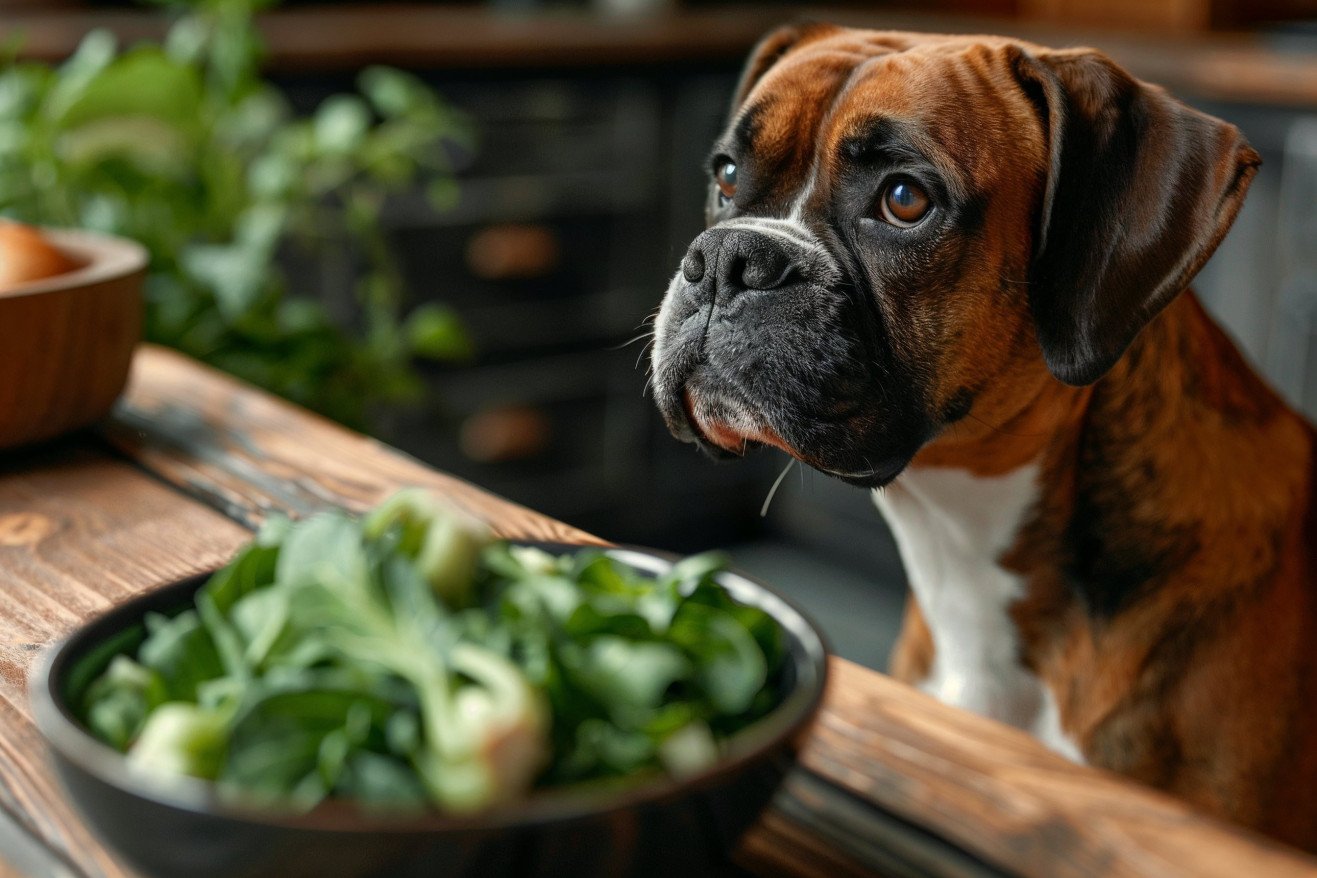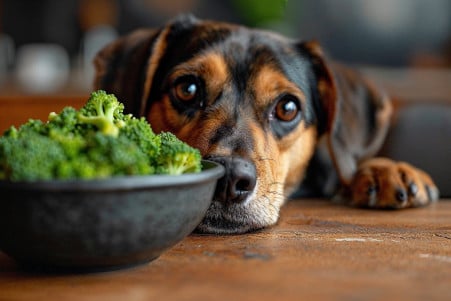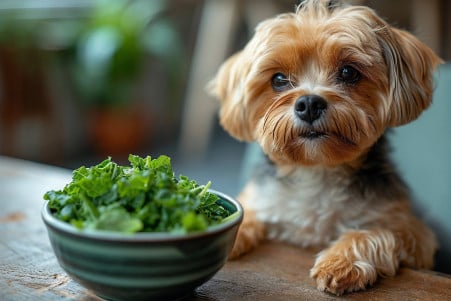Can Dogs Have Bok Choy? Safely Adding Greens to Your Dog’s Diet
23 February 2024 • Updated 22 February 2024

Bok choy is a superfood for humans, but can it be a superfood for dogs too? The answer is yes, dogs can eat bok choy in moderation. Bok choy is packed with vitamins A and C, and fiber.
Make sure you feed it to your dog in bite-sized, easy-to-digest pieces that are washed and either raw or cooked without any added seasonings to avoid choking and make it as easy as possible for your dog to eat.
In the article below, we will take a deep dive into a wide variety of veterinary and nutritional sources to give you a full picture of the topic of feeding bok choy to dogs. From learning about the specific vitamins and minerals that bok choy can add to your dog’s diet, to the best ways to prepare and portion it, we’ve got you covered.
Our hope is to give you the information you need to confidently and beneficially feed your dog bok choy.
Can dogs have bok choy?
Nutritional Profile of Bok Choy for Dogs
Incorporating bok choy into your dog’s diet can be a great way to take advantage of the many nutrients found in the cabbage family. This cruciferous vegetable is full of vitamins A, C, and K, as well as minerals like calcium, potassium, and magnesium, all of which support your dog’s vision, cardiovascular health, immune system, and bone health.
The fiber in bok choy can also help with digestion, although A report by A-Z Animals notes that it’s best to feed it in moderation to avoid digestive issues or gas because of its fibrous content.
The dark green leaves and white stalks of bok choy can be fed to your dog, and each part has its own nutritional benefits. The leaves are especially high in vitamins, while the stalks can add a satisfying crunch and some extra hydration.
Preventive Vet suggests introducing bok choy to your dog’s diet slowly to make sure they don’t have any adverse reactions and to make sure you’re not disrupting the balance of their diet, which should be made up mostly of high-quality animal protein.
As you add this vegetable to your dog’s diet, remember that variety is the spice of life for your pet as well.
How to Feed Your Dog Bok Choy
As you start to feed your dog bok choy, it’s important to make sure that you’re preparing it in a way that will make it safe and enjoyable for them. First, make sure to wash the bok choy thoroughly to remove any dirt and other potential toxins, according to a canine nutritionist.
If you decide to cook the bok choy, steaming or boiling it is the best way to go. Dogs can digest cooked bok choy better, and it should be served plain without any additional seasonings or oils that could upset their stomach.
When you serve it, cut the leafy greens into small pieces to reduce the risk of choking, which is especially important for smaller dogs or dogs that tend to inhale their food. While the exact amount of bok choy that you should serve your dog will depend on their size and dietary requirements, a good general rule is to make sure that the bok choy is a small part of their meal.
It’s suggested that you can have fun with it by blending bok choy and mixing it in with your dog’s regular food, or even freezing it in ice cube trays for a fun and refreshing treat.
These are all ways that you can make sure that you’re adding the benefits of bok choy to your dog’s diet while keeping things interesting. By making sure to add bok choy in a thoughtful way, you can make sure that you’re adding its extra nutrients and health benefits to your dog’s diet.
The Nutritive Boost: How Bok Choy Can Improve Your Dog’s Health
Bok choy isn’t just another leafy green; it’s packed with antioxidants that can help improve your dog’s health. These antioxidants, which include vitamins A and C, help fight free radicals that can cause damage at the cellular level and lead to chronic illness.
Hepper says that the vitamin A in bok choy can help with a dog’s eyesight, while vitamin C can help boost the immune system. Meanwhile, the high levels of vitamin K in bok choy can help with heart health, which is important for ensuring your dog has the energy to stay active.
The high levels of minerals in bok choy can help improve bone health, according to Healthline’s nutritional assessment. Magnesium, calcium, and phosphorus all help improve bone density, which is important for dogs at every stage of life. Meanwhile, the fiber in this cruciferous vegetable can help improve digestion and gut health, which is an important part of a dog’s overall health.
WebMD explains that quercetin, a flavonoid with anti-inflammatory properties that’s found in bok choy, can help lower the risk of disease and improve the quality of life for dogs that are living with chronic joint issues. While the impact on dogs specifically hasn’t been well-researched, the potential benefits are definitely there.
Adding bok choy to a well-rounded diet can help improve your dog’s nutrition and help them live a long, healthy life. That said, it’s important to make sure that you’re taking your dog’s specific needs and health history into account when you’re making changes to their diet.
Warning Signs: How to Tell if Bok Choy Is Bad for Your Dog
Although bok choy can be a healthy addition to your dog’s diet, there are some potential downsides. One of the most common, according to Spoiled Hounds, is that dogs can experience digestive issues or bloating due to the high fiber content in bok choy. This can lead to diarrhea or gas, so it’s important to make sure that you’re only feeding your dog bok choy in moderation.
Another potential downside is the fact that cruciferous vegetables can have an impact on thyroid function, and bok choy is part of this family. According to Preventive Vet, this means that people who have dogs with thyroid issues should be especially careful.
Allergies are also a potential issue, although they are less common. Spoiled Hounds warns that you should look out for signs of an allergic reaction, such as itching, scratching, or sneezing, after your dog eats bok choy for the first time. Puppies and dogs with pre-existing health conditions may be more susceptible to the potential downsides of bok choy, and therefore may need a diet that is more tailored to their specific needs.
If your dog experiences vomiting, lethargy, or changes in their stool after eating bok choy, it’s a good idea to talk to your vet. These could be signs that your dog isn’t tolerating bok choy well, and you may need to reevaluate their diet to make sure that it’s meeting their needs and keeping them healthy.
How to Add Bok Choy to Your Dog’s Diet: A Step-by-Step Guide
When adding any new food to your dog’s diet, it’s important to do so slowly and in moderation to avoid stomach upset.
The American Kennel Club recommends a 5–7 day transition period when switching foods, and this can be a good rule of thumb to follow when introducing bok choy to your dog.
To start, add a small amount of finely chopped bok choy to your dog’s regular food, making sure it doesn’t make up more than 25% of the meal. Over the next few days, you can slowly increase the amount of bok choy you’re giving your dog if they don’t experience any negative side effects.
It’s important to pay close attention to how your dog reacts to the new food. Watch for signs of gastrointestinal upset, such as gas or changes in stool, as the experts at Tufts University’s Clinical Nutrition Service have pointed out. If you notice any of these symptoms, cut back on the amount of bok choy you’re giving your dog and talk to your vet.
It’s also important to note that bok choy should be used to supplement a balanced diet, not replace it. Make sure the other foods you’re feeding your dog are complete and nutritionally balanced.
And, as always, talk to your vet before making any major changes to your dog’s diet, as they can provide personalized guidance based on your dog’s unique health concerns. If you follow these guidelines, you can make sure your dog reaps the nutritional benefits of bok choy in a safe way.
In Conclusion: How Bok Choy Fits into Your Dog’s Diet
Bok choy is a nutritious, healthy vegetable that can be a great addition to your dog’s diet if you are careful about how you introduce it. It is full of vitamins A, C, and K, minerals like calcium, and dietary fiber, so it can help support your dog’s immune system and bone health, among other things.
That said, it’s important to remember that everything should be done in moderation and with the proper precautions. Make sure to cut the bok choy into small pieces and wash it thoroughly, and don’t give your dog too much at once.
It’s also important to make sure you continue to monitor your dog for any signs of distress after they eat bok choy, and to talk to your vet about any dietary changes you are considering making. While vegetables like bok choy can be a great addition to your dog’s diet, it’s important to make sure that you are feeding them a well-rounded diet.
That said, if you follow the advice above, you should be able to safely give your dog bok choy and take advantage of its many health benefits while minimizing the risks. Here’s to your healthy, happy, and well-fed dog!


